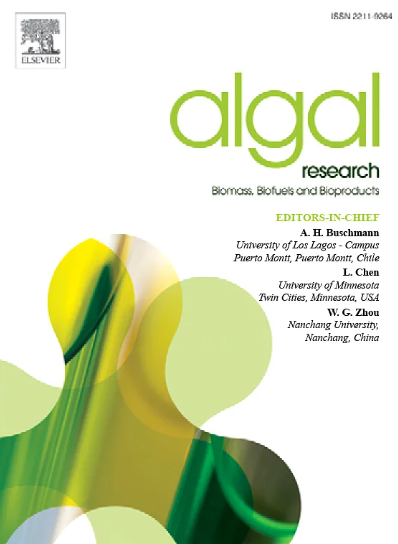MicroalgaeNet:通过多专家网络和特征压缩增强长尾海洋微藻图像的识别
IF 4.5
2区 生物学
Q1 BIOTECHNOLOGY & APPLIED MICROBIOLOGY
Algal Research-Biomass Biofuels and Bioproducts
Pub Date : 2025-10-01
DOI:10.1016/j.algal.2025.104333
引用次数: 0
摘要
海洋微藻的识别是评价天然水体生态状况的关键。本研究提出了一种新的方法来解决人工显微检查中效率低下、精度有限和长尾数据分布固有的挑战。与以往主要关注数据增强或重加权的工作不同,我们首次引入了基于resnext -50的多专家网络,结合基于指数函数的特征压缩机制,以提高对海洋微藻图像的识别。这种创新的方法特别减轻了类不平衡对分类性能的影响。该方法在世界卫生组织浮游生物数据集上进行了评估,该数据集包括23种海洋微藻的图像。我们提出的方法设置了一个新的最先进的(SOTA)基准,实现了领先的平均精度88%和平均召回率86.62%。该模型显著优于基线(p<0.05),表明其识别尾部类别的能力增强。此外,由于推理延迟为8.556 ms,我们的模型在实际部署中具有很强的可行性。结果表明,该方法可有效提高海洋微藻的识别性能,为海洋微生物研究和生命科学应用提供有价值的支持。本文章由计算机程序翻译,如有差异,请以英文原文为准。
MicroalgaeNet: Enhancing recognition of long-tailed marine microalgae images through multi-expert networks and feature compression
The recognition of marine microalgae is crucial for assessing the ecological status of natural water bodies. This study presents a novel approach to address the challenges of inefficiency, limited Precision, and long-tailed data distributions inherent in manual microscopic examination. Unlike previous works focusing mainly on data augmentation or re-weighting, we introduce for the first time a ResNeXt-50-based multi-expert network, coupled with an exponential-function-based feature compression mechanism, to improve the recognition of marine microalgae images. This innovative approach specifically mitigates the impact of class imbalance on classification performance. The method is evaluated on the WHIO-Plankton dataset, which comprises images of 23 marine microalgae species. Our proposed method sets a new state-of-the-art (SOTA) benchmark, achieving a leading average precision of 88% and an average recall of 86.62%. The model significantly outperforms the baseline (), demonstrating its enhanced ability to identify tail categories. Furthermore, with an inference latency of 8.556 ms, our model demonstrates strong feasibility for real-world deployment. These results indicate that the proposed approach can effectively enhance the recognition performance of marine microalgae, offering valuable support for marine microbial research and life science applications.
求助全文
通过发布文献求助,成功后即可免费获取论文全文。
去求助
来源期刊

Algal Research-Biomass Biofuels and Bioproducts
BIOTECHNOLOGY & APPLIED MICROBIOLOGY-
CiteScore
9.40
自引率
7.80%
发文量
332
期刊介绍:
Algal Research is an international phycology journal covering all areas of emerging technologies in algae biology, biomass production, cultivation, harvesting, extraction, bioproducts, biorefinery, engineering, and econometrics. Algae is defined to include cyanobacteria, microalgae, and protists and symbionts of interest in biotechnology. The journal publishes original research and reviews for the following scope: algal biology, including but not exclusive to: phylogeny, biodiversity, molecular traits, metabolic regulation, and genetic engineering, algal cultivation, e.g. phototrophic systems, heterotrophic systems, and mixotrophic systems, algal harvesting and extraction systems, biotechnology to convert algal biomass and components into biofuels and bioproducts, e.g., nutraceuticals, pharmaceuticals, animal feed, plastics, etc. algal products and their economic assessment
 求助内容:
求助内容: 应助结果提醒方式:
应助结果提醒方式:


